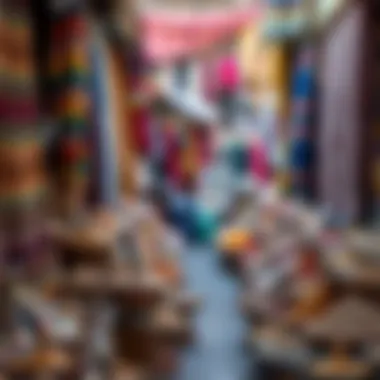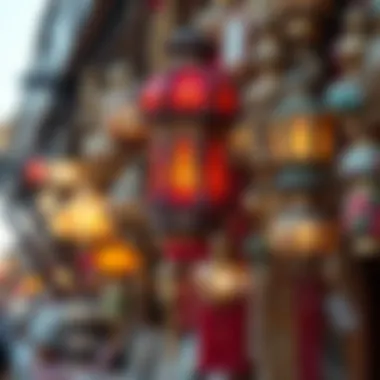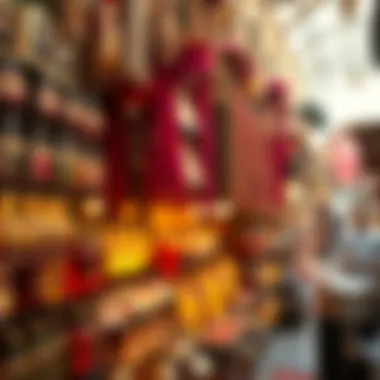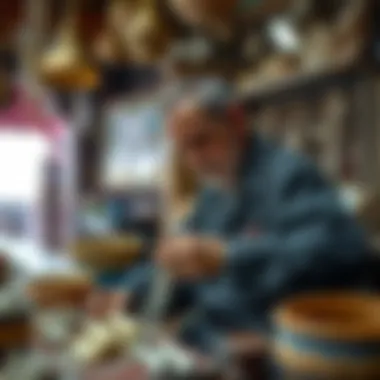Discovering Dubai's Souks: Hours and Insights


Intro
The souks of Dubai are not just markets; they're a vibrant tapestry of culture, history, and commerce. Each twist and turn in these bustling alleyways can unveil a treasure trove of unique goods, from fragrant spices to intricate textiles. Visitors often find themselves swept away by the kaleidoscopic colors and sounds that define these lively environments.
As one strolls through the narrow paths, it’s hard not to feel a connection to the past. These souks have been integral to Dubai’s development and economic evolution, serving as social hubs where traditions collide with modernity. Understanding the operating hours of these marketplaces, along with their cultural significance and offerings, is essential for anyone aiming to immerse themselves in the essence of Dubai.
Whether you're a curious traveler looking for that perfect souvenir, or you’re on the hunt for investment opportunities in this dynamic city, navigating the souks with insight can significantly enhance your experience.
In this article, we will explore the operating hours of various souks, delve into what makes each unique, and provide tips on how to make the most of your visit. By the end, you’ll have a well-rounded grasp of what to expect amidst the colorful chaos of Dubai’s souks.
Preamble to Dubai's Souks
Dubai's souks are more than just markets; they are living relics that narrate the rich story of a culture shaped by centuries of trade and interaction. The significance of these markets transcends mere economics; they represent the beating heart of the city's heritage, illuminating the past while interweaving it with contemporary life. Understanding the essence of Dubai's souks is essential for anyone wanting to grasp the full tapestry of this dynamic city.
Cultural Heritage of Souks
The soul of Dubai’s souks lies in their cultural heritage. Each souk is a showcase of local craftsmanship and traditions. Take the Gold Souk, for example, where the shimmer of gold jewelry reflects more than just wealth; it mirrors the skilled artisans who have honed their craft over generations. These markets are not merely places to shop; they are vibrant community hubs that foster social interaction and cultural exchange.
The Spice Souk, with its aromatic wafts of saffron and cardamom, embodies the region's diverse culinary influences. This sensory experience is a testament to the historical importance of spice trade routes that has connected the East and West for centuries.
"A visit to the souks is a deep dive into the lifestyle, where the past feels present, and the marketplace rushes through your veins like a heartbeat."
Economic Importance
Economically, the souks are significant contributors to Dubai's prosperity. They attract both locals and tourists alike, creating a bustling environment where commerce thrives. Moreover, they provide a unique opportunity for small businesses and local artisans to flourish, reinforcing both community spirit and economic resilience.
The Gold Souk alone holds an immense value, with its array of shops boasting a staggering display of gold and precious stones. This not only attracts buyers but also investors looking for valuable assets in a region known for its jeweled flamboyance.
Furthermore, the various specialty souks—from the textiles that showcase colorful fabrics to the Perfume Souk where scents tell stories—create avenues for economic diversification. In an age where online shopping is often favored, the traditional souk stands its ground by offering experiences that digital platforms cannot replicate.
In summary, Dubai's souks are the convergence point of cultural heritage and economic vitality. As markets continue to evolve, they remain a focal point for anyone interested in the intricate layers of life in this vibrant city.
Types of Souks in Dubai
Dubai is a treasure trove of markets that reflect its rich cultural landscape and trading history. The souks of Dubai come in various forms, each highlighting unique aspects of traditional and modern retail. understanding these types is crucial for anyone wanting to fully experience this bustling metropolis. Different souks offer distinct vibes, goods, and experiences, catering to a wide array of visitors, from casual shoppers to savvy investors.
Traditional Souk
The traditional souk is where the spirit of old Dubai truly shines. These markets are a feast for the senses; the sights, sounds, and smells swirl around you like a chaotic dance. The aroma of spices mingles with the rustling of fabric as vendors beckon with their vibrant products. Here, you'll find handmade crafts, textiles, and maybe even the last few pounds of traditional gold jewelry made by local artisans. These markets are not just about buying goods; they’re a tangible link to the past, showcasing a way of life unchanges throughout generations.
Modern Souk


In contrast, the modern souk shines a light on Dubai’s evolution into a global shopping hub. These spaces are designed with sophistication, often featuring air conditioning, wide walkways, and contemporary retail stores. Places like Souk Al Bahar offer an upscale selection, complete with cafes and entertainment options. The modern souk serves as a bridge between the past and the present, blending shopping with lifestyle, making it a also a popular choice for tourists.
Specialty Souks
Specialty souks carve out a niche market within Dubai’s retail scene. They focus on specific items, turning shopping into an exploration of unique cultures and tastes.
Gold Souk
The Gold Souk is one of Dubai's most famous attractions. This market is a shining beacon for investors and collectors alike. With an extensive range of gold jewelry and intricate designs, it boasts a glittering atmosphere that captivates. What sets this souk apart is its competitive pricing, allowing buyers to haggle for the best deal. Here, you’ll find traditional pieces as well as modern designs, catering to all tastes. The aura is practically intoxicating, turning window shopping into a delightful experience.
Spice Souk
For those seeking a sensory adventure, the Spice Souk is a must-visit. The vibrant colors of spices piled high entice your imagination. Here, you can find everything from saffron to cardamom, all steeped in history and tradition. The friendly merchants provide samples, inviting visitors to get a taste of local flavors. It’s not just about the purchase, but the experience of engaging with the local culture, which elevates your shopping experience.
Textiles Souk
The Textiles Souk offers an elaborate array of fabrics, ranging from colorful silks to embroidered cottons. It captivates fashion enthusiasts and designers looking for unique materials that aren’t found anywhere else. You can lose track of time as you sift through the fabric, each bolt telling its own story. Additionally, the artisans often offer customization options for tailoring, making it a prime spot for bespoke creations.
Perfume Souk
Lastly, the Perfume Souk is a hidden gem that provides insights into the world of Arabic fragrances. Visitors can find traditional oils, attars, and a wealth of aromatic concoctions. This souk is not just about buying; it’s about the stories behind each scent, many of which date back centuries. The allure of creating a signature fragrance is both intimate and personal, leaving a lasting memory of your time in Dubai.
Exploring the types of souks is not just an act of shopping but also of diving into the cultural fabric of Dubai itself. Each souk offers a distinct piece of the city’s history and commercial heartbeat.
Operating Hours of Dubai Souks
Understanding the operating hours of Dubai's souks holds significant relevance for visitors looking to explore these traditional markets. Knowing when to visit can greatly enhance the shopping experience, allowing you to navigate the vibrant aisles with ease while taking advantage of the unique offerings specific to each souk. Additionally, many souks have specific times when they are most bustling, enriching the experience of cultural interaction and engagement with local merchants. The importance of this topic cannot be overstated; it sets the stage for the entire visitation process, ensuring a well-planned and pleasurable journey through one of Dubai’s cultural treasures.
General Operating Hours
In general, the typical operating hours for Dubai's souks are around 10 AM to 10 PM, with some extending hours during weekends. The Gold Souk, for instance, often aligns with these hours but might stay open a bit later, especially during peak tourist seasons. Meanwhile, the Spice Souk and Textiles Souk offer a slightly different schedule, with many merchants opening a little earlier, around 9 AM.
Operating hours can fluctuate based on the time of year, with Ramadan being a notable exception. During this holy month, you might find that many souks open later in the evening to accommodate those breaking their fast.
To ensure a fulfilling experience, it’s advisable to visit late in the afternoon or early evening when the temperatures cool off. This is when the souks come alive, filled with locals and tourists alike, exchanging stories, goods, and ideas, making it a cultural haven.
Seasonal Variations
When discussing seasonal variations in operating hours, one cannot ignore the impact of Dubai's weather and cultural events on these traditional marketplaces. During the hotter months, especially from May to September, souks may adjust hours to ensure that both merchants and customers can avoid the sweltering heat. As a result, many of them tend to open later in the day.
- Summer Adjustments: In the peak summer months, you might notice some souks opening later, around noon and closing around midnight, especially to cater to tourists seeking evening activities after the sun goes down.
- Ramadan Hours: As mentioned earlier, Ramadan significantly alters hours. Most souks will shift to open only after iftar, making for an atmospheric shopping experience amidst festive night markets.
- Public Holidays: Local public holidays also play a role. During Eid al-Fitr and Eid al-Adha, souks might have extended hours, allowing for increased shopping opportunities as families go out to celebrate.
Important Insight: Be mindful of local events or holidays if you’re planning a visit, as hours can change to accommodate the festive atmosphere, impacting accessibility.


With the right knowledge of the operating hours and seasonal variations, you can easily navigate your visit to the souks, experiencing a slice of Dubai life that transcends shopping, making it a truly immersive cultural encounter.
Visitor Experience in Souks
The experience of visiting the souks in Dubai goes far beyond mere shopping; it encapsulates the essence of the city’s culture and legacy. In the frenetic atmosphere of vibrant markets, visitors are often swept away by the waft of spices, the gleam of gold, and the chatter of haggling voices. A day spent in these traditional marketplaces not only enriches one’s shopping bags but also serves to cultivate a profound appreciation for the history and heritage intertwined within these bustling lanes.
Navigating the Markets
Finding your way through the narrow, meandering pathways of Dubai's souks can be likened to embarking on an adventurous treasure hunt. Each corner turned unveils a new discovery. To navigate successfully, it’s essential to keep a few key points in mind:
- Landmarks: Recognizable landmarks, such as the Dubai Creek and nearby mosques, can serve as compass points. You can easily spot the intricate woodwork of a nearby wooden building as you shuffle along.
- Local Guidance: The friendly faces of shopkeepers or local vendors who know the markets like the back of their hands can guide you. Don’t hesitate to ask for directions – most are open and willing to help.
- Timing: Early mornings or late afternoons, when the sun casts long shadows, can be the best times to explore. The heat can be somewhat less punishing, and the markets tend to be less crowded.
Remember: Stay alert and don't be shy to pause and take in the scenery.
Bargaining Culture
When it comes to the art of negotiation in the souks, expect to engage in what feels like a spirited dance. Bargaining here is not merely a transactional interaction, but rather an essential facet of the buying experience. Visitors often find that the initial price given is just a conversation starter. This practice serves multiple purposes:
- Cultural Interaction: Engaging in bargaining offers a glimpse into UAE’s social fabric and its interactions. Locals view it as a form of entertainment and a way to build rapport.
- Price Awareness: Understanding the typical market prices for goods beforehand can be invaluable. Familiarizing yourself with what items should cost can lead to more successful negotiations.
- Mutual Respect: Approaching bargaining with a respectful attitude ensures a more favorable outcome. Whispers of negotiation or a small smile can go a long way in making the whole process enjoyable for both parties.
It’s common to start at half the initial asking price and expect to meet somewhere in the middle. Each deal concluded can culminate in not just a purchase but also a memorable exchange.
Culinary Delights
Among the enticing array of offerings in Dubai's souks, the food scene resonates deeply with local culture. Exotic flavors and aromas fill the air, making every corner a potential culinary adventure. As you wander through the alleys, consider indulging in:
- Local Snacks: Don't skimp on trying samosas or kebabs, both savory staples of Middle Eastern cuisine that are sold hot and fresh. Their flavor and spice will delight your palate.
- Sweets: The sweet scent of dates and baklava beckons. Vendors often offer samples, so feel free to indulge your sweet tooth and discover new favorites.
- Traditional Beverages: Refresh yourself with a cup of karak chai, a spiced, tea that's popular among residents and visitors alike. Its rich taste is often enhanced with a touch of cardamom, creating a unique flavor blend.
In sum, the visitor experience is a crucial lens through which we can appreciate not just the products available but also the lively spirit of Dubai’s souks. These markets encapsulate a rich tapestry woven from myriad interactions and cultural exchanges. A visit here, filled with exploration, negotiation, and gastronomic delights, leaves an indelible mark on any traveler’s journey.
Tips for Visiting the Souks
Visiting the souks of Dubai can be an exhilarating experience, akin to diving into a treasure chest full of rich culture and vibrant colors. However, navigating these bustling markets requires an understanding of their unique dynamics. Having a good grip on practical tips for visiting enhances not only your shopping experience but also your cultural immersion. The souks are more than just shopping spots; they are social hubs where history and commerce intersect. Thus, understanding the best times to visit, transport options, and cultural etiquette will help you make the most of your time in this enchanting environment.
Best Times to Visit
Timing can make or break your souk experience. Early mornings or late afternoons often present the most enjoyable atmosphere.
- Morning Hours: The temperatures are cooler, making it pleasant to stroll through the labyrinth of narrow lanes. Vendors are fresh and lively, ready to engage in friendly conversation and perhaps even offer samples.
- Later in the Day: As evening approaches, the souks get livelier with locals and tourists alike flocking to shop or simply enjoy the atmosphere. The golden hour light casts a magical glow over the stalls, making for picturesque moments.
- Weekdays vs. Weekends: Consider weekdays for a calmer experience, while weekends tend to attract larger crowds. If you are keen on avoiding the hustle, aim for midweek visits.
Transport Options
Getting to the souks can be part of the adventure itself, with various transport options available.


- Metro: A cost-effective choice, the Dubai Metro connects major areas, with stations near the gold and spice souks. It’s air-conditioned, efficient, and provides a glimpse of the city’s modern infrastructure.
- Taxis and Rideshares: Taxis are plentiful, with the added convenience of ridesharing apps. They can save you a bit of walking and make it easier to transition between different souks, especially on warm days.
- Walking: For the adventurous at heart, walking provides an opportunity to discover side streets and hidden gems. Just be prepared for warm weather and wear comfortable shoes.
Cultural Etiquette
Understanding local customs goes a long way in enriching your experience. Souks are steeped in tradition, so respecting cultural norms is essential. Here are a few key points:
- Dress Modestly: While Dubai is relatively liberal, it's advisable to dress respectfully, especially in traditional areas. Loose-fitting clothing that covers shoulders and knees is a good choice.
- Engage Politely: Bargaining is common, and engaging in playful banter is part of the charm. However, always approach negotiations with respect and good humor.
- Photography: Always ask permission before snapping pictures of vendors or their goods. This shows respect and fosters goodwill.
Remember, the souks are not just places to shop; they are a vibrant expression of the local culture, and how you navigate it can greatly affect your experience.
By keeping these tips in mind, you'll navigate the charming chaos of Dubai’s souks with grace and confidence, ensuring that your visit is both memorable and enriching.
The Role of Souks in Real Estate Market
The traditional souks in Dubai are more than just vibrant marketplaces; they hold a significant position within the city's real estate ecosystem. This section delves into the role of these bustling hubs, focusing on their direct and indirect benefits to the local economy and real estate development. As the demand for luxury apartments and commercial ventures rises, the relevance of souks becomes increasingly evident. Investors, homeowners, realtors, and developers can gain valuable insights into how these markets influence property value and community dynamics.
Impact on Local Businesses
The presence of souks greatly affects the landscape for local businesses in Dubai. Small vendors thrive on the foot traffic generated by these traditional markets. Many of these businesses, especially those in the food, fashion, and handicraft sectors, rely heavily on customer interactions in the souk settings. Investors looking to delve into real estate should note how the proximity to these souks can enhance the desirability of residential or commercial properties.
- Increased Footfall: Having a property near a souk translates to increased visibility. Shops and restaurants close to these bustling markets often report higher sales.
- Community Engagement: Souks encourage the community to engage with local vendors, fostering a sense of belonging and patron support.
- Cultural Significance: The unique cultural offerings found in souks can make surrounding real estate more attractive, especially to expats and tourists.
In effect, the real estate market flourishes alongside the existing souk structures, as developers target locations near lively marketplaces. Investors must consider how those dynamics evolve with changing foot traffic and consumer preferences.
Tourism and Hospitality Nexus
The link between Dubai's souks and the tourist and hospitality sectors is another vital area of interest. As travelers flock to Dubai, they seek authentic experiences that capture the essence of local culture. Souks serve as a primary attraction for visitors, offering not just goods but a taste of the ancient trading traditions that the city was built upon.
- Attracting Tourists: Each souk offers unique attractions, drawing in both local and international visitors. This traffic bolsters the demand for nearby accommodations, whether hotels or vacation rentals.
- Enhanced Property Values: Properties situated near souks may experience a surge in demand from tourists needing convenient access to shops and dining, thus raising overall property values in those areas.
- Increased Rental Opportunities: Real estate investors can capitalize on the tourism influx by turning properties into short-term rental offerings, catering specifically to those eager to explore the local souk culture.
Thus, the health of the real estate market is intricately tied to the souks. Knowing the interdependence between these elements allows stakeholders to make informed decisions on investments and developments. As the future unfolds, it remains paramount for real estate professionals to keep a finger on the pulse of both the souks and the wider property market.
"The souks of Dubai are vibrant arteries of economic activity, breathing life into the local businesses and, by extension, the real estate market."
By understanding the role of these marketplaces, investors and developers can navigate the evolving landscape of Dubai's real estate effectively.
Epilogue: Embracing the Souk Experience
Visiting the souks in Dubai is not merely a shopping excursion; it serves as an immersive exploration of a cultural tapestry woven through centuries. These markets embody the soul of Dubai, where modernity meets antiquity in a vibrant display of commerce, tradition, and social interaction. Understanding this intricate relationship enables investors, homeowners, realtors, developers, and analysts to appreciate the broader implications of engaging with these markets.
Reflection on Market Evolution
The evolution of Dubai's souks reflects the changing dynamics of trade and consumer preferences. Initially rooted in a barter system, today’s souks have adapted to a global market, integrating not just local vendors but international influences. The Gold Souk, for instance, exemplifies this hybridization. While it continues to boast traditional craftsmanship, it also showcases global trends in jewelry design. This shift allows investors to see how heritage can coexist with modern commerce. The juxtaposition of old and new in these marketplaces illustrates economic resilience and the agility of local businesses.
In the past few decades, the vibrancy of the souks has significantly transformed with ongoing development, enhancing their commercial appeal. This evolution introduces opportunities for investors looking to tap into the tourism and retail markets that these historical sites attract. As the demand for culturally immersive experiences increases, there’s an undeniable shift towards integrating markets like Gold Souk and Spice Souk into larger commercial strategies, benefiting both suppliers and consumers alike.
"The souks are more than just places to buy; they are a living history, filled with stories, scents, and the essence of Dubai’s trading spirit."
Future of Souks in Dubai
Looking ahead, the future of souks in Dubai hangs on the balance between heritage conservation and modernization. With urban expansion and the infusion of technology into daily life, there’s a need to ensure that these markets retain their essence while adapting to contemporary trends. Enhancements such as virtual tours and online marketplaces are beginning to emerge, making the shopping experience more accessible to a global audience.
Furthermore, initiatives to blend sustainability with commerce are also gaining traction. This not only attracts eco-conscious visitors but also promotes local artisans who are adept at environmentally friendly practices. Therefore, combining traditional elements with modern practices could very well define the next chapter for Dubai’s souks.







